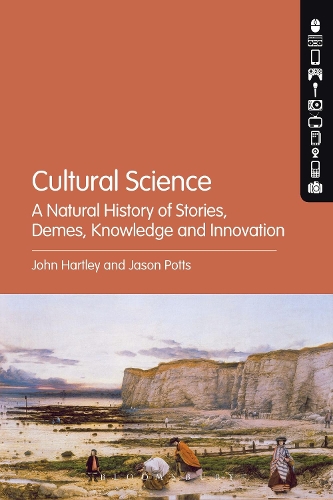
Cultural Science: A Natural History of Stories, Demes, Knowledge and Innovation
(Hardback)
Available Formats
Publishing Details
Cultural Science: A Natural History of Stories, Demes, Knowledge and Innovation
By (Author) Prof. John Hartley
By (author) Dr. Jason Potts
Bloomsbury Publishing PLC
Bloomsbury Academic
1st September 2012
United Kingdom
Classifications
Tertiary Education
Non Fiction
Media studies
306
Physical Properties
Hardback
264
Width 156mm, Height 234mm
553g
Description
This book is available as open access through the Bloomsbury Open Access programme and is available on www.bloomsburycollections.com. Cultural Science introduces a new way of thinking about culture. Adopting an evolutionary and systems approach, the authors argue that culture is the population-wide source of newness and innovation; it faces the future, not the past. Its chief characteristic is the formation of groups or 'demes' (organised and productive subpopulation; 'demos'). Demes are the means for creating, distributing and growing knowledge. However, such groups are competitive and knowledge-systems are adversarial. Starting from a rereading of Darwinian evolutionary theory, the book utilises multidisciplinary resources: Raymond Williams's 'culture is ordinary' approach; evolutionary science (e.g. Mark Pagel and Herbert Gintis); semiotics (Yuri Lotman); and economic theory (from Schumpeter to McCloskey). Successive chapters argue that: -Culture and knowledge need to be understood from an externalist ('linked brains') perspective, rather than through the lens of individual behaviour; -Demes are created by culture, especially storytelling, which in turn constitutes both politics and economics; -The clash of systems - including demes - is productive of newness, meaningfulness and successful reproduction of culture; -Contemporary urban culture and citizenship can best be explained by investigating how culture is used, and how newness and innovation emerge from unstable and contested boundaries between different meaning systems; -The evolution of culture is a process of technologically enabled 'demic concentration' of knowledge, across overlapping meaning-systems or semiospheres; a process where the number of demes accessible to any individual has increased at an accelerating rate, resulting in new problems of scale and coordination for cultural science to address. The book argues for interdisciplinary 'consilience', linking evolutionary and complexity theory in the natural sciences, economics and anthropology in the social sciences, and cultural, communication and media studies in the humanities and creative arts. It describes what is needed for a new 'modern synthesis' for the cultural sciences. It combines analytical and historical methods, to provide a framework for a general reconceptualisation of the theory of culture one that is focused not on its political or customary aspects but rather its evolutionary significance as a generator of newness and innovation.
Reviews
Humans have evolved to make culture in the same way birds have evolved to make nests and spiders to make webs. Even more telling is the fact that culture has evolved over hundreds of thousands of years to make human nature what it is. In this ambitious and persuasive work, Hartley and Potts offer a vision of the unification of behavioral science and cultural studies that shatters traditional disciplinary boundaries. * Herbert Gintis, External Professor, Santa Fe Institute, USA, and Professor of Economics, Central European University, Hungary, and author of A Cooperative Species: Human Reciprocity and its Evolution (with Samuel Bowles, 2011) *
Hartley and Potts Cultural Science firmly grounds the study of culture in a Darwinian evolutionary framework, emphasising how knowledge, morality, innovation and even personal identity emerge from the power of groups or demes pursuing shared goals, often in competition with other similar demes. Cultural Science is suitable for lay audiences and also as a reference text for the modern scholarly study of culture. * Mark Pagel, Professor of Evolutionary Biology, University of Reading, UK, Fellow of the Royal Society, and author of Wired for Culture *
The charm of Cultural Science is rather like that of watching David Attenborough or Brian Cox in full flight, peering into rock pools, turning over fossils, bringing to light creatures that are both fascinating in themselves and hold clues to the possibilities of life and the universe. Whatever else it may be, this is an intellectual adventure, full of curious details and surprising discoveries. It brims with enthusiasm and pedagogical passion. ... It is a 'dangerous book in the best sense ambitious, experimental and heedless of risk. -- Mark Gibson (Monash University, Australia) * Communication Research & Practice *
Cultural Science is a wonderfully mind-challenging, expansive book that is boldly ambitious. ... As I read it, at times I had moments of exclaiming 'but! but! but!', yet those are signs of how thoroughly it challenged me to reconsider and reconceive much of the field of media, communication, and cultural studies, and much of the work within it. Generative, 'big picture' books like this are rare. -- Jonathan Gray (University of Wisconsin-Madison, USA) * Communication and the Public *
Author Bio
John Hartley is Professor of Cultural Science and Director of the Centre for Culture and Technology at Curtin University, Western Australia; and Professor of Journalism, Media and Cultural Studies at Cardiff University, Wales. He was co-founder of the Australian Research Council's Centre of Excellence for Creative Industries and Innovation at Queensland University of Technology, where he held an ARC Federation Fellowship and was founding Dean of the Creative Industries Faculty. He has held visiting scholar positions in the USA, UK, China, Germany and Denmark. He was awarded the Order of Australia for service to education, and holds fellowships of the Australian Academy of the Humanities, Royal Society of Arts, and International Communication Association. He has published more than 20 books (as author, co-author or editor) in communication, cultural and media studies, including Popular Reality (Bloomsbury). Jason Potts, Schumpeter Prize winner, is ARC Future Fellow, Professor and Principal Research Fellow in the School of Economics, Finance and Marketing at RMIT University, Melbourne, Australia; and Editor of the Journal of Institutional Economics. He is the author of 6 books and over 80 papers in evolutionary economics and innovation.
